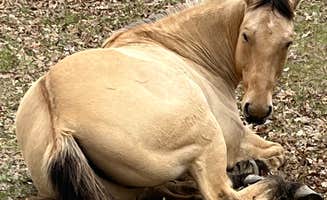Cooper Lake State Park provides multiple equestrian camping options near Wolfe City, Texas. Located within the Blackland Prairie region, the terrain features rolling grasslands mixed with stands of oak and hickory. The park lies approximately 30 minutes southwest of Wolfe City, with average summer temperatures reaching 95°F and mild winters rarely dropping below 30°F.
What to do
Trail riding along lakeshores: At Bright Star Campground, equestrian campers can access several miles of bridle trails. "I went for a weekend with the family to tent camp. It was our first time there. We found the staff to be extremely friendly and helpful, the whole park was well-kept and the facilities were clean," reports Jesse M.
Fishing from horseback: The lakeshore at East Fork Park Campground offers access points where riders can stop while horses rest. "The sites are well spaced and are 'mostly' paved with aging asphalt. The roads are in need of repair, with numerous potholes, some very large," notes Ray & Terri F. Plan for extra time navigating between fishing spots.
Overnight trail camping: Coffee Mill Lake Recreation Area trails connect to longer routes through National Grasslands. "I am always pleasantly surprised with 'national' organizations' campgrounds. Whether a national forest or like this one, national grasslands, they are always pretty good, and this one is no exception," writes Micah W. Riders report the trail system is well-marked with regular water access.
What campers like
Private, natural settings: Rockin Bar B Ranch offers a secluded alternative to public campgrounds. "Ver private and natural setting," according to Bobbi S. The ranch maintains four sites on spacious acreage, allowing horses to graze more freely than at state park facilities.
Spacious equestrian campsites: At Deer Haven Campground, the sites accommodate both camping equipment and horse trailers. "Very large camp site ver clean," says Rich H. The concrete pads are spaced to provide separation between horses from different groups.
Oak tree shade coverage: Many campsites offer natural protection from summer sun. "The concrete pad at site 68 was level and shaded by a beautiful, mature oak tree. I could walk from the pad to the lake," reports Susan L. The mature trees provide cooling for horses during hot Texas days.
What you should know
Bring your own containment system: No permanent corrals exist at most sites. Campers must bring portable panels, picket lines, or high-line equipment.
Limited manure disposal facilities: Campers are responsible for managing horse waste. Plan to bring tools for cleanup and containment bags for transport away from the camping area.
Seasonal mud concerns: After rainfall, areas between campsites can become muddy. "Our site, 25, was a pull-through, but the center of it had about 4 inches of mud from a recent rain, otherwise it would just be 4 inches of dirt," notes Ray & Terri F. about Bright Star Campground.
Variable cell service: Coverage depends on specific location within the parks. "AT&T coverage was pitiful, with only 1 bar of LTE service and speeds up to 0.1 MB/s," reports one camper. Consider downloading offline maps before arrival.
Tips for camping with families
Choose lakeside sites for dual activities: Sites near water allow non-riders to fish while others trail ride. "My only complaint is that access to the lake is limited to a few campsites and a day use area that could easily be overwhelmed on a busy day," cautions Jesse M.
Check trail difficulty ratings: Some horse trails at Coffee Mill Lake Recreation Area accommodate beginners. "The campground is small, maybe 12 sites, vault toilets decently cleaned, and multiple water spigots. The sites have picnic tables, fire pits and are well spaced," Micah W. notes.
Plan for limited shade at some locations: While trees exist, not all sites offer equal coverage. "There weren't a lot of trees and none over the RV pads, so keep that in mind as far as the sun beating down on the camper," advises Christina H.
Consider wildlife viewing opportunities: Many families appreciate the chance to spot local wildlife. "I did see deer who ventured in from the wooded area next to the campsite. Deer Haven lived up to its name!" reports Susan L.
Tips from RVers
Bring leveling equipment: Many horse-friendly sites require adjustment. "Our site was very unlevel on the hill, so bring your chocks," recommends Cheryl D. about COE Lavon Lake Lavonia.
Check gate hours: Some parks restrict overnight entry. "Front gates don't open til 10am every morning so can't get back in if you go get breakfast," notes Natalie S.
Reserve well ahead for holiday weekends: Horse-friendly sites are limited and fill quickly during peak seasons, particularly at the more developed campgrounds with full hookups.
Test trailer positioning before unhitching: Due to site layout variations, position your rig to optimize both camping comfort and horse monitoring. "We've camped in the site with the horse stables and put the tents with questionable rain flys in the horse stable," suggests Brian about creative use of equestrian facilities.


